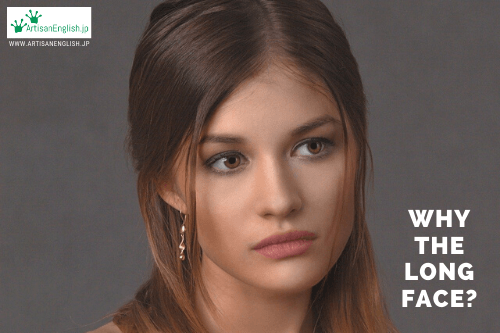
YouTube / iTunes / Spotify / Radio Public / Pocket Casts / Google Podcasts / Breaker / Overcast
Listen to ArtisanEnglish.jp posts & lesson intros here.
WotD: Long face
A horse walks up to a mirror and says, “Why the long face?” The mirror says, “It’s OK. I’m just a bit reflective today.”
Ha, ha, ha, that’s a funny joke.
It’s OK. I know you’re only laughing because everyone else is.
The thing is, everyone else is smiling because you are. It’s a corny joke.
When you have a long face, you look sad.
Horses have long faces because their nose is so far away from their eyes.
Now, long faces don’t make horses look particularly sad, but when a human has a long face, well, people want to ask, “Why the long face?”
It would be best if you never talked to mirrors because they are quite intelligent.
Mirrors can show you the truth, but you see only what you want to see.
The mirror in our story today is particularly smart because she made a play on words with ‘reflective.’
Mirrors reflect. It’s what they do.
However, when people (or horses) reflect, they think back on the past.
Often the past makes us sad because we look back at history with rose-coloured glasses and remember everything as being so much better then.
Therefore, people who reflect often have a long face.
Now, horses who are reflecting don’t necessarily look any different than they usually do.
They could be happy, sad, or indifferent, and we’ll never know because, well, horses always have long faces even when they are not sad.
Mirrors reflect, and horses have long faces.
That’s just the way things are.
When humans are reflective, they, too, have long faces.
The bigger question you never thought about asking is why is a horse talking to a mirror, and more importantly, how did the mirror answer?
That’s freaky!
Flesch-Kincaid Readability Test
This post is understandable by someone with at least a 7th-grade education (age 12).
On the Flesch-Kincaid reading-ease test, this post scores 78.
The easier a passage is to read, the higher the score on a scale of 0 – 100.

